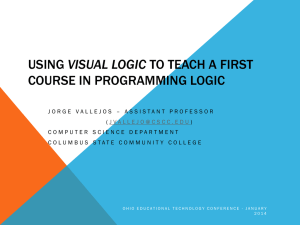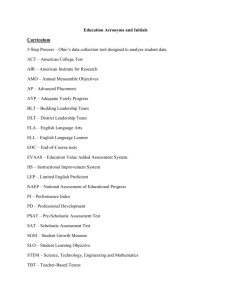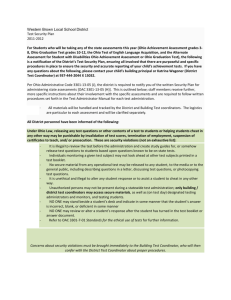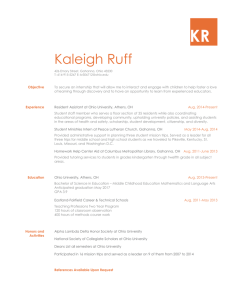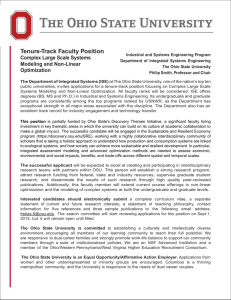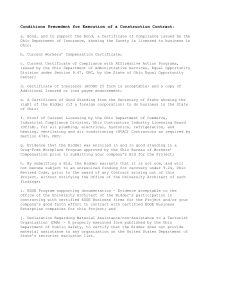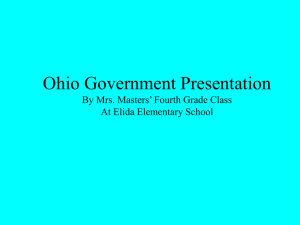Using Visual Logic To Teach A First Course In
advertisement
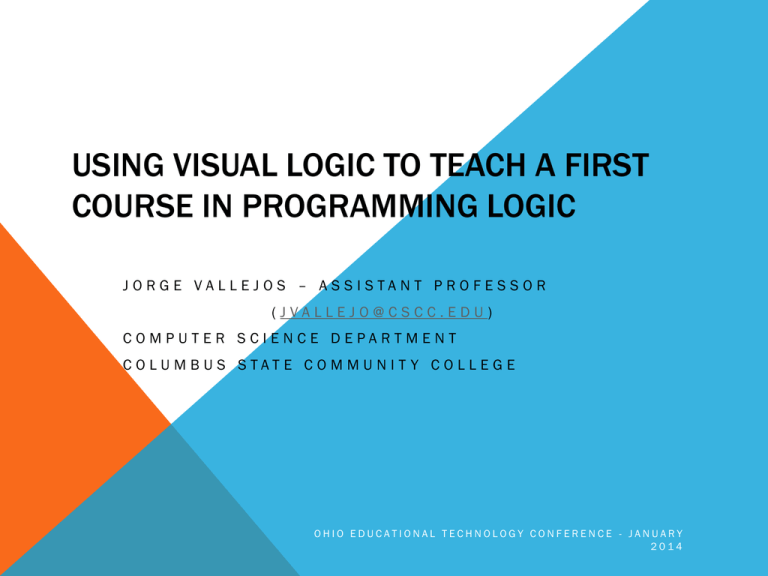
USING VISUAL LOGIC TO TEACH A FIRST
COURSE IN PROGRAMMING LOGIC
JORGE VALLEJOS – ASSISTANT PROFESSOR
(JVALLEJO@CSCC.EDU)
COMPUTER SCIENCE DEPARTMENT
C O LU M B U S STAT E C O M M U N IT Y C O LLE G E
OHIO EDUCATIONAL TECHNOLOGY CONFERENCE - JANUARY
2014
LOGIC – AND BENEFITS TO OUR STUDENTS
•
What Is Logic ? – Loose Definitions :
• The application of principles of correct reasoning
• Proper thinking about the understanding of something
• Interrelation of facts and events to reach valid conclusions
•
Why Is Logic Necessary?:
• Solve complex tasks by applying systematic reasoning
• Establish an approach to analyze and understand a problem
• Discover simple and efficient solutions to implement processes and systems
•
What Do Students Gain By Learning Logic?:
• Develop skills for critical thinking
• Gather relevant facts, analyze them, and derive conclusions to troubleshoot systems
• Apply problem solving strategies – formalize theories, discard invalid assumptions,
establish priorities (ordering of actions and validation), solve problem in incremental
steps, isolate/reproduce issues, test solutions
• Readiness for programming courses and other analytical courses
OHIO EDUCATIONAL TECHNOLOGY CONFERENCE - JANUARY
2014
2
COURSES THAT SUPPORT PROGRAMMING
LOGIC
•
MATH courses – beyond the algorithms and formulas, MATH creates the
foundation to discover relations between entities, combine building blocks to
compose new entities, build sets of detailed instructions to complete a task
•
READING /WRITING courses focused on comprehension – analyze complex
materials, apply critical analysis to reach conclusions, inductions and deductions
•
PHYLOSOPHY courses: cover topics like: critical thinking, methods of inductive,
deductive and symbolic logic.
OHIO EDUCATIONAL TECHNOLOGY CONFERENCE - JANUARY
2014
3
TOOLS FOR A FIRST COURSE IN PROGRAMMING
LOGIC
•
Visual Logic
• Creates visual representation of algorithms in flowchart format. The program
does not use formal programming-language instructions – like Java, C#, or
other programming languages
•
Alice/Alice3 – by Carnegie-Mellon
• Creates 3D animations. Tool is oriented towards learning computer
programming. Drag objects from a palette onto a scene canvas. Objects are
constructed from Java classes. Methods are presented as menus – to control
the actions performed by objects
•
•
Scratch – by MIT
• Create animated objects. The program uses a list of instructions to control the
actions performed by objects
Others – search the Internet
OHIO EDUCATIONAL TECHNOLOGY CONFERENCE - JANUARY
2014
4
VISUAL LOGIC FEATURES
•
•
•
Variables: non-typed numeric and string constants
• There is no variable declaration – variables are created at the point of use
Constructs:
• Assignments
• Operators
• Arithmetic (+, -, *, /, Mod, ^), Comparison (<, >, …), Compound (AND, OR, …)
• Sequences
• Conditions: if-then-else
• Loops
• while, do-while, for – control of execution can be modified by the exit, continue
clauses
• Arrays
Procedures (a.k.a., modules): named set of instructions.
• Parameters: passed by value, passed by reference
• Do not return a value
OHIO EDUCATIONAL TECHNOLOGY CONFERENCE - JANUARY
2014
5
VISUAL LOGIC FEATURES - CONTINUED
•
Functions
• FormatCurrency(), FormatPercent(), Round(), Random(), …
• There is no Wait()/Sleep()-equivalent function. Alternative: use a busy-donothing loop
•
Input/Output
• Dialog boxes, Console, File
•
Enforces Structured Programming – There is no GOTO instruction
• All programming structures have a single entry/exit point
• It is not possible to create spaghetti-code
OHIO EDUCATIONAL TECHNOLOGY CONFERENCE - JANUARY
2014
6
VISUAL LOGIC PITFALLS
•
Variables are created at the point of use. When a variable identifier is misspelled,
Visual Logic creates a new variable
• Example:
• Correctly spelled variable identifier: firstName.
• Misspelled variable identifier: fisrtName – Visual Logic creates the new
variable identifier with a default zero (0) value
•
Visual Logic does not enforce syntax – (justification: students learn logic better
when focusing on the concepts – rather than syntax)
• It is possible to create an invalid comparison in comparison/loop statements:
• while (YES <> number) { … }, where YES stores the string constant “y”, and
number is a numeric constant.
• The comparison evaluates as false – no syntax error, the loop does not
execute
• An existing string variable can afterwards be assigned a numeric value
OHIO EDUCATIONAL TECHNOLOGY CONFERENCE - JANUARY
2014
7
VISUAL LOGIC DEMONSTRATIONS
•
Sequences
•
Decisions
•
Loops
•
Arrays
•
Parameterized Procedures
•
Graphics
OHIO EDUCATIONAL TECHNOLOGY CONFERENCE - JANUARY
2014
8
REFERENCES
•
Visual Logic
• http://www.visuallogic.org/
• A Guide to Working with Visual Logic. Thad Crews & Chip Murphy. Course
Technology – Cengage Learning. ISBN 978-0-324-60119-0
•
Alice
• http://www.alice.org/index.php
•
Scratch
• http://www.scratch.mit.edu
OHIO EDUCATIONAL TECHNOLOGY CONFERENCE - JANUARY
2014
9
